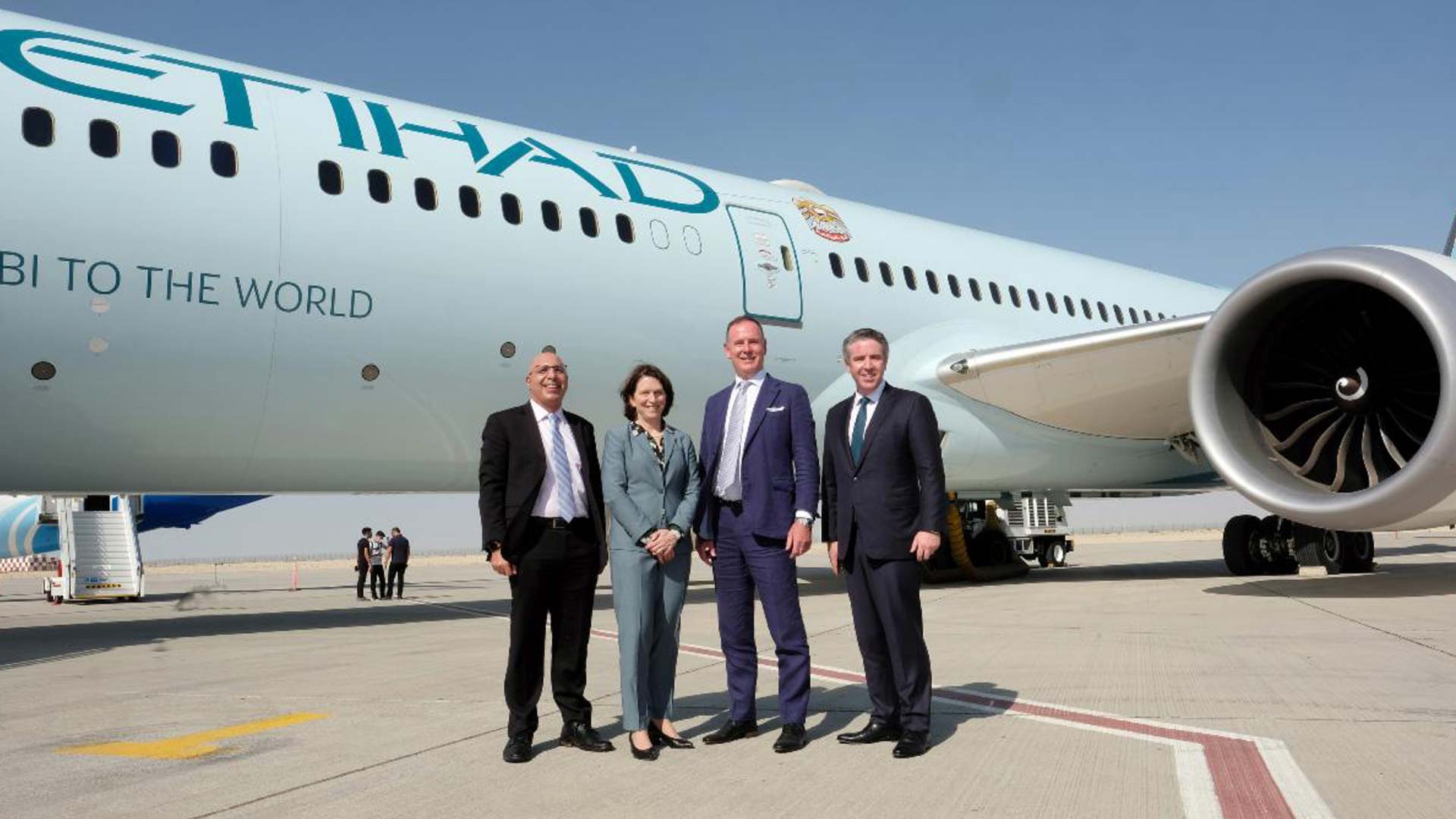Etihad Airways has signed multiple partnership and collaboration agreements with the aviation industry’s top manufactures, suppliers and stakeholders at the 2021 Dubai Airshow, bringing aviation’s leading organisations together under its strategic sustainability programme to drive decarbonisation.
The airline’s sustainability programme, which to date has been focused on the airline’s fleet of GEnX powered Boeing 787’s under the Greenliner Programme, will now be complimented by a similar programme focussed on maximising the opportunities presented by the inclusion of the Rolls Royce XWB powered Airbus A350 fleet. The first of Etihad’s A350s, launched at the Dubai Airshow as the “Sustainability50”, carries a unique “UAE50” livery in recognition of the 50th anniversary of the federation of the UAE and the airline’s commitment to the 2050 target of net-zero carbon emissions.
Etihad’s work with partners including Boeing, GE, Airbus and Rolls Royce supports the organisation’s strategic objectives to achieve a 20% reduction in emissions intensity in its passenger fleet by 2025, cut 2019 net emissions by 50% by 2035, and reach net zero emissions by 2050.
Speaking at Dubai Airshow, Tony Douglas, Group Chief Executive Officer, Etihad Aviation Group, acknowledged the uniting of these industry players for decarbonation is a unique and important step forward for the industry: “There's no silver bullet for this one, no obvious single act that will provide a solution. It's going to require the combination and the sum of many different organisations and governments working together for small, incremental improvements.
“Governments and regulators must help the industry to drive innovation for long-term solutions to decarbonising aviation. Support is needed for development of affordable and sufficient supply of sustainable fuels. Optimising flight paths on the busiest routes in the world would prevent untold amounts of Co2 from being pumped into the atmosphere. There is a big opportunity here that doesn’t require any new technology to implement and could be implemented today if there was a will.
Stan Deal, president and chief executive officer of Boeing Commercial Airplanes, said: “Partnership is critically important to decarbonize our industry, and we are honored to work side-by-side with Etihad to advance sustainable aviation. Our flight test programs and other joint efforts over the past two years have clearly demonstrated the value of industry collaboration.”
Based on Etihad’s fleet of 787s, the renewal today of the Etihad, Boeing and GE agreement under the Greenliner Programme will also see a renewed focus on propulsion, exploring new opportunities to test new technologies from GE Aviation and GE Digital that lower emissions.
John Slattery, President and Chief Executive Officer of GE Aviation, said: “Decarbonization is a challenge that the entire aviation industry faces. The only way that we can address it is with agreements like this MOU with Etihad. Through this agreement, GE will be able to test innovative technologies that can help reduce emissions as well as enhance the time on wing of our GEnx engine, which may benefit Etihad and all our airline customers.”
Douglas went on to say: “As we continue our march towards sustainable aviation, we know that we cannot do this alone. Etihad’s Greenliner Programme was designed as a vehicle for collaboration, successfully bringing together over 50 partners in the past two years. As we now expand that Programme with the introduction of the A350 under the Sustainability50 programme, we once again make a call to arms, inviting more stakeholders across the aviation industry to help us on this path.”
Etihad’s partnership with Airbus establishes a formal framework to collaborate for sustainability across a number of core areas on Etihad’s A350 fleet, in line with the organisations’ respective sustainability programmes to improve aviation’s environmental performance. Key areas for collaboration include the promotion and commercialisation of sustainable aviation fuel, waste and weight management, and the development of data driven analysis.
The pursuit of sustainable aviation goes beyond the manufacturers of aircraft and engines, and the Dubai Airshow launch of the airline’s expanded Sustainability Programme, included agreements with many new partners, both within and outside the aviation industry.
Etihad and Lufthansa Technik AG have signed a Memorandum of Understanding (MoU) regarding a comprehensive partnership on the exploration of digital solutions that is set to further optimize the airline’s technical fleet and operations management.
SATAVIA and Etihad Airways signed a Memorandum of Understanding (MoU) to form a partnership focussing on reducing the airline’s non-CO2 footprint via advanced flight planning optimisation.
Etihad and Tadweer (Abu Dhabi Waste Management Center) signed a Joint Project Development Agreement (JOP) on waste to fuel initiatives, as part of the nation’s targets to divert 75% of waste from landfills by 2025 and the sectors compliance with CORSIA, toward decarbonization through utilization of Sustainable Aviation Fuels.
Etihad Airways and The Storey Group signed a Memorandum of Understanding (MoU). Following the operation of the Etihad Sustainable Flight, the airline adopted a mangrove for each passenger on board the flight from Abu Dhabi’s Jubail Mangrove Park to support the development of mangrove conversation projects in the nation.
Douglas concluded: “We need to be bold in addressing the climate issues facing the planet. We need to be decisive. There is no other way forward. That is why we have been insistent that we continue to focus on the challenges and opportunities, many of which are available today, as a fundamental strategic priority for our business, spearheaded by the Etihad Sustainability Programme comprising the Etihad 787 Greenliner and Airbus A350 Sustainability50 fleets, and the many partners who have now joined in the crusade. We will succeed, because we must”.

